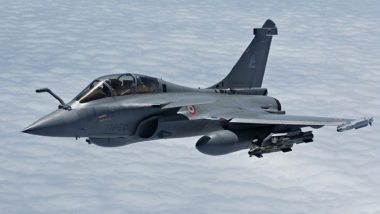New Delhi, November 12: The purchase of the French Rafale fighter jet was in conformity with the process laid down in the Defence Procurement Procedure of 2013 and there was an apparent lack of common understanding between the public sector HAL and Dassault Aviation, analysts have said.
The "lack of understanding" involved "manhours" and "responsibility of aircraft," the analysts said, adding that was why the Rafale deal could not be concluded during the UPA government.
The deal was finally approved by the Cabinet Committee on Security after year-long protracted negotiations, including 26 meetings, with the French side, they said. Rafale Deal: Supreme Court Refuses To Issue Notice To Narendra Modi Government, But Seeks Report Over Decision Making Process.
They said the Indian Negotiating Team (INT) held 74 meetings during 12 months from May 2015 to April 2016, including 48 internal meetings and the proposal was presented to the Defence Acquisition Council (DAC) thrice from August 2015 to July 2016 for getting approvals on various aspects of negotiations.
A total of 74 meetings which included 48 internal INT meetings and 26 external INT meetings with French side were held during negotiations of the Rafale deal. pic.twitter.com/afVgXzQKZT
— GreatGameIndia (@GreatGameIndia) November 12, 2018
The Indian Air Force top brass has in the past termed the NDA government's deal for 36 Rafale aircraft as a "much better deal" than that of the Congress for 126 planes.
IAF vice-chief Air Marshal S.B. Deo and deputy chief Air Marshal R Nambiar have said the IAF got a better deal than the one negotiated by the Congress in 2008, in terms of price, maintenance terms, delivery schedule and other related issues.
The analysts said contract negotiations, extending over more than three years, could not be concluded due to lack of common understanding between Hindustan Aeronautics Limited and Dassault Aviation, the manufacturers of Rafale, due to "HAL asking for 2.7 times more manhours as compared to Dassault" and "responsibility for 108 aircraft to be manufactured in India by HAL."
The negotiating team, they said, achieved "better terms relating to price, delivery and maintenance" as compared to the previous offer by Dassault for MMRCA during the UPA regime.
The Modi government has told the Supreme Court that the purchase of 36 Rafale fighter jets in a fly-away condition was in conformity with the process laid down in the DPP of 2013.
"It is reiterated that that the procurement process as laid down in the Defence Procurement Procedure (DPP)-2013 was followed in procurement of 36 Rafale aircraft. The approval of DAC (Defence Acquisition Council) for procurement of 36 Rafale aircraft was taken, Indian Negotiating Team (INT) was constituted which conducted negotiations with the French side for about a year and approval of CCS (Cabinet Committee on Security) being CFA (competent financial authority) was taken before the signing of IGA (inter-government agreement)," the Centre said.
The Centre has given other procedural details of the deal to the top court in a sealed cover, which it shared with the petitioner, M.L. Sharma and NGO Common Cause, on Monday, in pursuance of the top court's October 31 order.
The proposal to purchase 36 Rafale fighter jets from France under an inter-government agreement (IGA) was approved by the CCS August 24, 2016. The IGA or offset contract has no mention of any private Indian business house.
The analysts said contracts worth Rs 7,45,000 crore were signed through IGAs since 2002 under DPP and majority of these were during UPA regime with the NDA government "taking forward the same process."
The also said that two offset contracts were signed, one with Dassault Aviation and another with the defence firm MBDA on September 23, 2016, and are governed by offset guidelines of Defence Procurement Procedure (DPP) 2013 when UPA was in power. In case of Dassault, offset obligations will also be discharged by 21 Tier-1A sub-vendors and in case of MBDA by 12 Tier-1 sub-vendors.
According to media reports, the value of Dassault offset obligations is only 19.9 per cent or less than Rs 6,000 crore. In case of MBDA, it is 6.27 or approximately Rs 1,800 crore. The offset contract with Dassault does not envisage manufacture of 36 Rafale aircraft in India by any public or private sector company.
The reports also said that the annual offset implementation schedule, as per offset contract, will commence from October next year and Dassault and MBDA are yet to submit a formal proposal for Indian Offset Partners (IOPs).
The DPP allows OEMs (original equipment manufacturers) to provide the details of their IOPs either at the time of seeking offset credits or one year prior to discharge of offset obligations.
According to media reports, both Dassault and MBDA have not claimed any offset credits to date based on the latest mandatory six monthly reports to be submitted by OEMs. They also said that Dassault, within two weeks of being declared the lowest bidder by the UPA Government, had entered into a pact for partnership with Reliance Industries in Feburary 2012.
As per DPP-2013 and the earlier procedures applicable under the Congress-led UPA government, the government has no role in selection of IOPs.
Dassault Aviation has issued a press release stating it has signed partnership agreement with several companies and is negotiating with 100-odd other companies for discharge of offsets.
The Dassault Aviation (DA) was declared L1 in the competitive process during UPA regime in January 2012.
Union ministers including Finance Minister Arun Jaitley have repeatedly denied Congress allegations that the deal to procure 126 Rafale aircraft negotiated by the UPA government was cheaper and said that the basic aircraft price procured by the NDA government was nine per cent cheaper than the price negotiated by the UPA.
Jaitley has also said that along with add-ons such as India-specific adaptations, weaponry and other requirements, the "UPA price, which was mentioned in the 2007 L1 offer, would be at least 20 per cent costlier than the more favourable price negotiated by the NDA."
The government has also described the JV between Reliance Defence and Dassault Aviation as a "purely commercial arrangement between two private companies".
In its submission to the apex court, the Centre has cited security considerations to justify the aborting of the earlier process for the procurement of 126 jet fighters (18 in fly-away condition and 108 to be manufactured in India), and opting to purchase 36 Rafale aircraft instead, contending that,"during this long period of inconclusive 126 MMRCA process, our adversaries inducted modern aircraft and upgraded their older versions."
"Further," the government said, "They (adversaries) modernised and inducted aircraft with advance weapon and radar capabilities. As per available information, our adversaries inducted more than 400 fighters (equivalent to more than 20 squadrons) during the period from 2010 to 2015," it said.
(The above story first appeared on LatestLY on Nov 12, 2018 09:58 PM IST. For more news and updates on politics, world, sports, entertainment and lifestyle, log on to our website latestly.com).













 Quickly
Quickly


